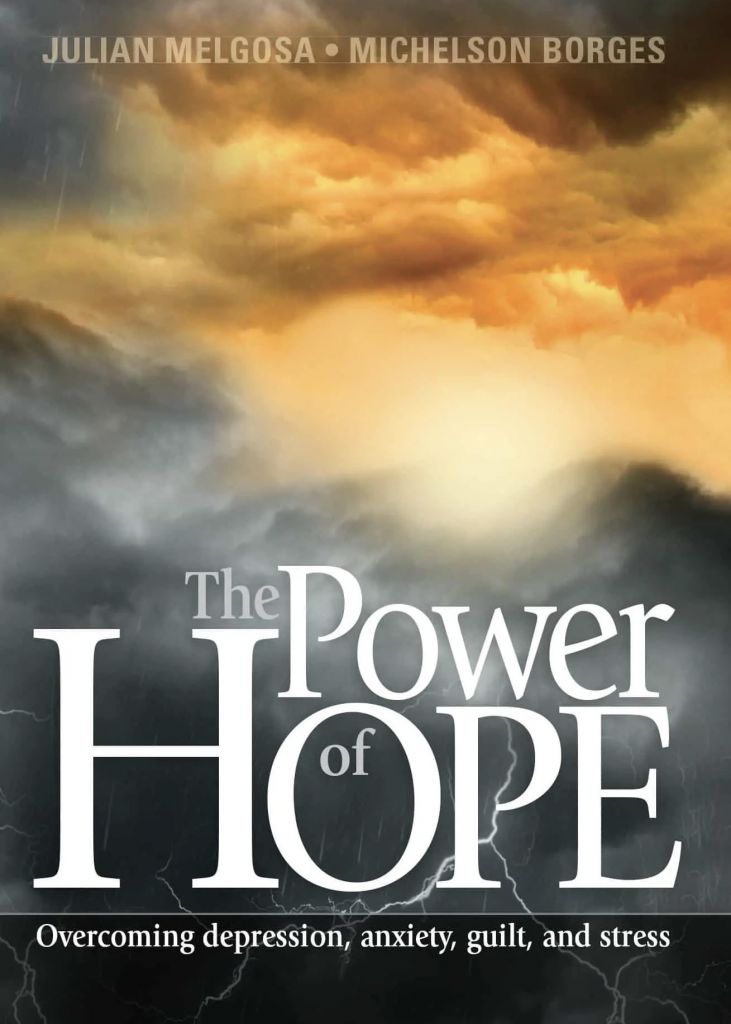Joseph, a young Hebrew who lived almost two thousand years before Christ, was born into a good family, and he soon demonstrated intelligence and vision. Motivated by jealousy, his brothers sold him as a slave to the residents of another country. In his new situation, he had to suffer in silence and adapt to the conditions, which were totally opposite of what he was accustomed. Joseph experienced traumatic situations of intense stress. However, he emerged honourably from these difficult tests, even reaching the highest of positions in Egypt.
How was Joseph able to preserve his mental health in the midst of such adversity? Joseph exercised his faith in God during many years of trials; he asked his Creator for strength to overcome such oppression; he prayed daily and maintained contact with God in moments of anguish. Above all else, he kept hope alive that someday the pain would pass. God reserved a happy ending for his life.

Joseph decided to act as an agent of change. He had every reason not to forgive, to charge unpayable emotional interest and to collect equally unpayable emotional interest, but he decided to repay all those involved in a completely different manner than the treatment he had received. The complete story is recorded in the book of Genesis, chapters 37 and 39–50.
Intense, emotionally charged events, especially if experienced at a difficult time in life or at an early age, can cause depression in the individual. Examples include a child who is ridiculed or suffers insults; is startled in the dark; is frightened by snakes or spiders; feels slandered; is coerced for sexual satisfaction; or loses a father or mother at a young age. In the same way that a serious physical accident leaves permanent marks, emotional traumas can leave aftereffects for many years.
The most visible consequences are manifested during the initial days and weeks following the experience — reoccuring dreams, passing memories, denial, anxiety, or lack of attention and concentration. In some cases, especially in children, the aftereffects can be permanent, becoming a strong barrier for a healthy mental life.
Traumas and tensions may even develop into an illness. “Animal studies have demonstrated that social, behavioural, and environmental factors can actually determine whether genes are expressed — that is, whether they are turned on or off. For example, stress has been shown to cause symptoms of diabetes, such as hyperglycaemia, in animals that are genetically susceptible to diabetes. Animals not exposed to stress conditions were less likely to develop hyperglycaemia or diabetes, even though they were genetically prone to the disorder.” (Norman B. Anderson with P. Elizabeth Anderson, Emotional Longevity: What Really Determines How Long You Live, New York: Viking, 2003, p. 5.)

Effects of past traumas
Traumas from the past can produce:
Insecurity
The individual self receives a large part of the traumatizing impact, and the person loses confidence in himself or herself, demonstrating insecurity.
Difficulty in accomplishing normal activities
The affected individual feels incapable of attaining simple objectives. For example, young women or girls who have been victims of sexual abuse usually have difficulties in relating socially to young men. Or the boy whose older brothers frightened him with a spider can develop a phobia in relation to spiders.
Paranoiac tendencies
The traumatised person demonstrates mistrust in the environment and can interpret neutral attitudes of other individuals as a trap against him or her and consider himself or herself as a victim of aggression or undue persecution.
Depression
The traumatising event usually is perceived as a loss (loss of honour, loss of a beloved person or pet), and all loss brings with it the risk of depressive symptoms.
Anorexia and bulimia
There is also a clear correlation between being a victim of sexual abuse and ending up with eating disorders, especially anorexia and bulimia.
How to overcome traumas
There are traumas that, because of their seriousness, require psychiatric treatment. Others, although without such drastic consequences, have a tendency to complicate the development of the individual’s life within normality. For this, we offer the following counsel:

Accept the past and focus on the future
If you get stuck dwelling on the past, you cannot look toward the future with the necessary trust. Additionally, it is good to remember that our mind does not have a perfect ability for registering data. Our memories are reconstructed events from the past, and these memories are affected by our feelings and by the comprehension that we have of them in the present.
Talk about the traumatic event
In a secure environment, talking (or writing) about the event that caused the trauma is a very important step. Look for a trustworthy person and tell him or her what happened. Group therapy is helpful for people who have experienced trauma. Hurts that cannot be stated will not be forgotten.
Look at the positive side
Disasters and calamities tend to unite survivors, families, and communities. Be grateful for the care demonstrated toward those who face tragedies. Additionally, when traumatic situations are faced courageously, they tend to strengthen the character of those who go through the experience.
Forgive
Although it is a process that can take a long time, forgiveness releases us from hate and resentment toward those responsible for the trauma. This is an important step toward resolution, and it is also applicable to ourselves — self-forgiveness and self-reconciliation. Resolving hate does not prohibit the victim from wanting a just conclusion to the traumatic experience.
Hurt and resentment make us prisoners of the past and continually remind us of what happened long ago. Truly, the person most affected by resentment is yourself.
Forgiveness, however, is not always spontaneous, because our capacity to love (to forgive is to love) is limited. Seek the Source of forgiveness — the God of love — who, according to the gospel, wants us to be His friends and can facilitate overcoming the past that overshadows us. Remember what the Lord’s Prayer states: “Forgive our debts, as we also have forgiven our debtors” (Matthew 6:12).
Write down the experiences
Melanie Greenberg and Arthur Stone carried out an interesting study at State University of New York at Stony Brook. A total of sixty university students participated, sharing their past experiences in the following steps:
1. The scientists grouped the participants into subgroups: those who had experienced a severe trauma, those who had lived through a low-severity trauma, and those who had not suffered any trauma.
2. Some participants were asked to reveal their experience in writing, and others were not given this opportunity, so that they could serve as a point of reference or as a control group.
3. During the following months, the health and disease tendencies of all participants were observed.
The results demonstrated that those who had gone through a severe trauma and revealed it in writing experienced much greater progress in physical health than those who had not written anything about their traumatic experience.
(Julián Melgosa, “Cicatrizes” [“Scars”], Saúde e Lar, January 2015)

Studies such as this demonstrate that revealing a traumatic experience is not only good for the soul but also for the body. One individual who supports this idea is the author and Nazi concentration camp survivor, Elie Wiesel. He wrote and rewrote his experiences of personal trauma, and through this he was able to find meaning and the significance of these traumas. Even if we are still not able to express our feelings and memories in an appropriate manner, we should still try.
Additionally, in the struggle to overcome trauma, it is essential for us to avoid self-victimization, but rather to look for comfort in religion, to create new objectives in life (perhaps even use the experience itself to do something good for other people), and to not nurture the desire for revenge or hate.
One last biblical counsel in this context is this:
“One thing I do: Forgetting what is behind and straining toward what is ahead, I press on toward the goal.”
(Philippians 3:13,14)
Resilience
The word resilience comes from physics and describes the capacity of some material to return to their original state or even improve their quality after they have been submitted to extreme situations. In human terms, resilience is the capacity of a person to recover emotional equilibrium or even to become stronger after going through a traumatic situation.
Evidently there are different levels of resilience, and they vary from person to person. What traumatises one individual may not necessarily affect another person so much. This depends on such factors as temperament, capacity to resolve problems, intelligence, self-esteem, social competence, self-control, family and social ties.
We cannot overemphasize the importance of good relationships. A study of 724 people throughout a period of more than seventy years concluded that wealth and fame do not guarantee happiness, neither do longevity or resilience. In reality, good relationships with family and friends extend life and make it more pleasant.
Robert J. Waldinger, psychiatrist and professor at the Harvard School of Medicine, coordinates this study currently. He cites three important lessons regarding relationships taken from this study in the United States: (1) social connections benefit human beings, while loneliness kills; (2) the quality of relationships is more important than the quantity; and (3) happy, long-lasting relationships protect physical and mental health. (Márcio Tonetti, “Segredo da Felicidade e da Longevidade” [“Secret of Happiness and Longevity”], Revista Adventista, February 17, 2016.)
“The experience of loneliness turns out to be toxic. People who are more isolated than they want to be from others find that they are less happy, their health declines earlier in midlife, their brain functioning declines sooner and they live shorter lives than people who are not lonely,” states Waldinger in this TED Talk available on YouTube. (Robert Waldinger, “What Makes a Good Life? Lessons From the Longest Study on Happiness.” Speech at TEDx Conference, November 2015)
But there is another factor as important as, or perhaps more important than, good social relationships.
Researchers today recognize that an important factor for the development and strengthening of resilience is religion. Besides providing a network of social support, religion provides a positive vision of the future. However, it cannot be just any religion, suggests psychiatrist Harold Koenig, who studies the relationship between religiosity and health at Duke University in North Carolina. He affirms that it is of no value for the individual to simply state that he or she is “spiritual” and not have a practical religious experience. It is vital to be committed to religion in order to enjoy its benefits. It is essential to attend worship services and express faith at home and in other locations through prayer and Bible study. He asserts that religious belief needs to influence one’s life so that it may also influence one’s health.

In an article in the magazine Vida e Saúde [Life and Health], Dr. Koenig explained that religious involvement reduces psychological stress, which decreases inflammation and the rate of telomere shortening in cells. He explained, “Telomeres are a biological clock for the cell. They shorten at each cell division, and when they are gone, the cell dies and organ degeneration occurs.” (Michelson Borges, “Saúde Emocional e Sspiritual” [“Emotional and Spiritual Health”], Vida e Saúde [Life and Health], June 2015, 8–13.) This explains why religious people live an average of seven to fourteen years longer, according to research.
Remember: religion will only be favourable if it is positive and focused on a good relationship with God and one’s fellow human beings. The Bible describes true religion in this way: “Religion that God our Father accepts as pure and faultless is this: to look after orphans and widows in their distress and to keep oneself from being polluted by the world” (James 1:27).
In this world, it is impossible to eliminate all traumatic situations. As resilient as a person may be, suffering knocks at their door and brings pain along with it. Why do things have to be like that?
The world is a battlefield
The Bible makes it clear that this world is a battlefield, and the conflict began far from here, in heaven. Ezekiel 28:13–19 and Isaiah 14:12–14 describe what ignited this conflict: pride and vanity. Lucifer was a perfect angel created by God; a type of chief angel, he was loved and respected by all. At some point in time, in a way beyond our understanding, jealousy began to emerge in his angelic heart, and he wanted the position that belonged only to the Creator. As a child of God, he had everything, but he decided that he would no longer offer reverence to the Eternal One and began to question the divine government and the law on which this government was based.
Knowing the character of God revealed in the Holy Scriptures, we can imagine that the Father tried everything to convince His child to repent of his sins and abandon the rebellion. But Lucifer decided to go forward with his plans, finally reaching the point of no return—the point at which the sinner no longer cares about sin and feels no desire to repent. His heart hardened to the appeals of the Holy Spirit.

Revelation 5:11 states that billions of angels exist. Many of them joined Lucifer’s rebellion. Was God really a tyrant, as Lucifer accused Him of being? Wasn’t the fact that He had laws that should be obeyed by His creatures proof that He was arbitrary? For the opposing angel, it was as if God’s law was an unjust obligation.
Some people ask themselves: If the omniscient God knew of Lucifer’s feelings from the beginning, why not destroy him before the controversy spread? Consider for a moment that for the heavenly angels this was a new experience; they had never experienced the thoughts and feelings now crossing their minds. There were doubts in heaven for the first time. If God had destroyed the rebel angel right at the beginning, what type of feeling could this have awakened in the other created beings? “Oh, so this is how things work here. You disobey, you die?” Do you see? The Creator had to allow the consequences of the rebellion to be known so all angels could make their choice and decide under which government they would like to live. He also offered an opportunity for the rebel to return to the right path of his own free will, but Lucifer finally decided not to do this.
Others go further and question: “Couldn’t God have created a universe where there was no evil?” Let’s try to explain this with another question: Could God create a square wheel? This does not make sense because the Creator does not violate His laws, and He does not work with illogical impossibilities. Therefore, to create a universe with beings that are endowed with the ability to choose, God needed to run risks. This is because a universe cannot exist with freedom without having the possibility of a choice for evil. God did not want to create automated beings—robots programmed to obey. God is love (1 John 4:8), and He wants to be loved. So it is important to remember that love is only manifested where there is freedom. No one can be forced to love.

Could God have created a universe without the potential for evil? Yes, but not this universe. Therefore, different from what some say, evil does not prove that the Creator does not exist. It proves exactly the opposite: that He exists and that He endowed us with the freedom to choose. Besides, if God did not exist, the definition of evil itself would lose all its meaning. After all, evil is the opposite of good. Without a moral absolute to serve as a parameter, how could what is good be determined? We only know that a line is crooked because we compare it to a straight line.
Unfortunately, one-third of the heavenly angels joined with Lucifer (later called Satan, or the enemy) and were expelled from heaven (Revelation 12:3,4,7,9), ending up on our planet. Here, Satan used deceit to involve Adam and Eve in his rebellion (Genesis 3:1–6). With much satanic cunning and intelligence, the enemy was able to inject Eve with the virus of his own rebellion. He suggested that if she disobeyed God, she would become a superior creature, reaching equality with her Creator. Lucifer was the one who wanted this! And he was able to convince the woman that she wanted it too.
The original lie could be summarized into two statements: (1) you will not die and (2) you will become like God. From then until now, the enemy has been disseminating this same lie under various disguises, all with the objective of distancing humanity from the Creator. Upon considering themselves as immortal and self-sufficient, people will leave off recognising their dependence on the Source of life. With this, the rebel wounds the heart of the Father.
Because of this, we can say that this planet is a battlefield. Continually, good and evil angels dispute their influence over us. We should always remind ourselves that
“our struggle is not against flesh and blood, but against the rulers, against the authorities, against the powers of this dark world and against the spiritual forces of evil in the heavenly realms.”
(Ephesians 6:12)
In a war, there are always traumatic situations. If you’re in doubt, ask a former soldier who has gone to battle. In spite of everything, our General is personally engaged in our salvation, even though we have to experience one war injury or another. Additionally, the General has already announced the end of all battles, on the occasion of His return.

How can we be certain that the General is really interested in us and did not abandon us in a mine field, leaving us without hope? It is simple. When Satan was able to involve Adam and Eve in the rebellion, he thought he had placed the Creator in checkmate. After all, the couple knew that the “wages of sin is death” (Romans 6:23). Since they had sinned, both deserved to die forever. If God destroyed them, the enemy would say something like this to all created beings: “Did you see? Didn’t I tell you that He is a tyrant and He is evil?” However, being aware of divine mercy, the fallen angel expected that God would overlook the attitude of disobedience of the transgressing couple. In that case, Satan could accuse the Creator of being incoherent and unfaithful to His own word. If He could ignore the guilt of the two humans, why not Satan’s own guilt?
However, the rebel did not count on something surprising, which left him speechless. Yes, “the wages of sin is death,” and someone must experience eternal death because of this, but it would not be Adam and Eve. God, in the person of Jesus, would die in the place of the sinner, assuming his or her guilt, and reveal in a grand manner the extent to which the General was willing to go because of His love for His children.
It is for this reason that He has a moral authority to say,
“Come to me, all you who are weary and burdened, and I will give you rest.”
(Matthew 11:28)
Neither Paul nor Laura nor Carlos, nor you or any other person, can change what has happened in the past. The war injuries are there on your body, in your mind, and on your heart. There is one thing, however, they can do, and you can do: change your attitude in relation to the things that took place before in the battles of life. Change the way you face these traumas.
The individual who trusts in the God of the Bible knows that “in all things God works for the good of those who love him” (Romans 8:28). Then, understand and accept that it is not God who originated evil. He uses these experiences from the battlefield to contribute toward your growth and your eternal salvation.
Trust in the Father. Trust in the General. He has already proven that He is worthy of this trust.
The content of this post is taken from The Power of Hope — Overcoming depression, anxiety, guilt, and stress, authored by Julián Melgosa and Michelson Borges.
Julián Melgosa holds a doctorate in educational psychology from Andrews University. A member of the British Psychological Society, he was a university professor and is the author of various articles and books in the area of emotional health.
Michelson Borges is a journalist with a master’s in theology from Brazil Adventist University. He is the editor of “Vida e Saúde” (Life and Health magazine), is a seminar presenter and has authored books on media, science and religion.





